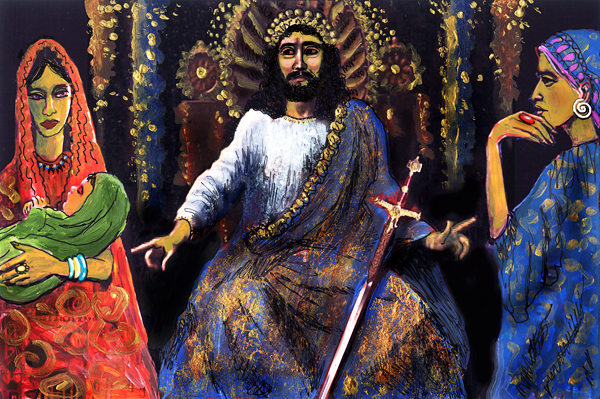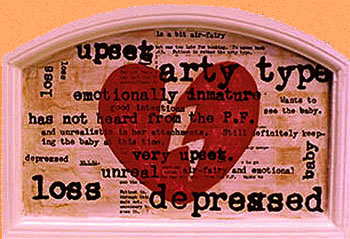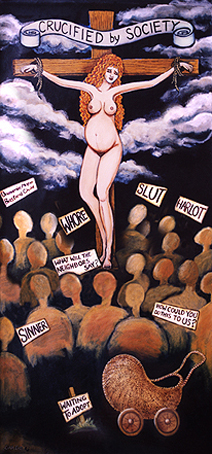| Home | Paintings | Drawings | Photography | Biography | CDs & Video | Links |
|---|---|---|---|---|---|---|
 |
 |
 |
 |
 |
 |
 |
*Birthmothers*
or back to: Adoption & Reunion
Birthmother, Biological mother, First mother, The woman who gave birth to me, Natural mother, Real mother, Relinquishing mother, The woman who gave me up for adoption, Other mother, whatever you choose to call her,
it was in her womb the baby, who was later adopted, began its earthly experience.
What kind of woman relinquishes her child to adoption? In the article, "Parental Loss of a Child," (Roll, Millen & Backlund) such a mother is referred to as "The Solomon’s Mother." This title was taken from an old biblical story of two women who asked King Solomon to settle the dispute of who was the real mother of a baby both claimed as theirs.
"King Solomon and the 2 mothers" from the "Bad girl" series, Lina Eve2
Solomon ordered the child to be cut in half and for each woman to take a piece. The real mother of the child yielded to the other woman, rather than see harm befall her child, and Solomon deduced her sacrifice was proof of her motherhood. (I would like to stress that the ideal of Motherhood portrayed in the story, is the non possessive caring love for the child. Most adoptive parents also feel this emotion. The other woman in the story is not meant to represent an adoptive mother)
The article continues: - "The term "Solomon’s Mother," though not perfect, does reflect the psychological reality of offering up one’s child (for adoption) in the hope of making the child’s life better despite the prospect of great pain.
It also addresses an historical injustice. In the biblical story, the lesson is that the people of Israel saw that the wisdom of God was in Solomon. The other unspoken and unheralded lesson is that women are often forced into a position of letting their children be separated from them under a real or imagined belief that the children will be better off."
For years I encountered only blank walls in my search for my daughter. I was told all hospital records had been destroyed in a fire. When the “Freedom of Information” laws were passed in Australia in 1991, miraculously my records turned up! These are some of the actual words that appeared on my social records. Spelling errors are included! At 17, I was labelled “emotionally immature” with “unrealistic expectations” because I wanted to keep my baby!
In the days before contraception was readily available, and sex education was sadly lacking in schools and homes, many unplanned pregnancies occurred. Some of these young mothers -to-be married their boyfriends, either by mutual consent or "shot gun" marriage. (the young couple being forced to marry, usually by their parents) In some instances the marriages may never have happened if pregnancy didn't push the guilt and responsibility buttons. Then there were the other pregnant girls, the ones who would become ... "Unmarried Mothers."
(or back to: Adoption & Reunion )
In an era when unmarried mothers were seen as immoral, when illegitimacy was frowned upon, when financial, social, and often family support was withheld, many young women were forced to view the relinquishing of their child to adoption, as their only option. There were also some married women in financial, personal and/or domestic difficulties for whom adoption seemed the only solution for their untimely pregnancy.
Abortion, in most cases was illegal unless a sympathetic doctor could be found who would consider the situation warranted risking their reputation. Illegal abortions were available, to those with the contacts who could pay the high fees, but it was a risky, often life threatening business.
These "back street" abortions carried a fearsome reputation of permanent scarring, infertility and even death. Young girls who found themselves pregnant would seldom know the location of abortionists, nor have the money to avail themselves of their services. Even if abortion had been within their means, many pregnant girls would choose to give their baby up for adoption rather than abort."Today the birthmother is asking us why, when we saw that she was carrying a heavy load, we pressured her to part with it instead of helping her find a way to carry it herself." (Anne B. Brodzinsky "The Birth mother’s Experience") Most birthmothers would dearly have loved to keep their babies, but support was seldom offered.
In a Patriarchal Society, an unmarried pregnant woman is scorned, because she is a threat to the established order. Therefore, in the days of secret adoption practices, an unmarried mother was relegated to the very bottom rung of society, just in case she was entertaining any ideas that a woman had any worth without a man to legitimize her, and her baby. These days, the situation is not much different if an unmarried mother lacks sufficient money to protect herself.
"Well, that’s what you get for playing up before marriage, or for being too poor, or otherwise desperate! Of course you'll have to give the baby up for adoption! Don’t let anyone know about this. You have shamed the whole family. We are going to send you away to a home for unmarried mothers. After you’ve had "it", you can come back and we’ll forget all about it. But how could you do this to us?
So you want to keep this baby? Don’t be ridiculous! How would you support yourself? What will people say? No one will want to marry a girl with a bastard. What will you do with the baby if you go out to work? don't expect us to look after it! Don’t you think the poor kid deserves a decent home with two respectable married parents?
What? You still want to keep your baby? How can you be so selfish? If you really loved your baby you’d give it up for adoption. What can you offer? You’re just a kid yourself. Come on, be sensible. You want the best for your baby, don’t you? Just sign here, there’s a lovely couple waiting, just longing for a baby to love. Think of the baby’s best interests. Don’t cry dear, you’ll put all this behind you as soon as you’ve signed the papers. You’ll be able to start a new life and Baby will be happy and well looked after."Most birthmothers of adoptees were young unmarried girls. Many of these girls were still in school or newly in the work force. They had neither the assertiveness nor knowledge of their rights to demand anything for themselves. The coercion of social workers, family and society often pushed them into adoption. In many cases in Australia, young unmarried mothers were heavily drugged after they gave birth to make them compliant. They seldom had any support or anyone by their side when they were bullied and coerced into signing adoption papers. The market for babies available for adoption was at a high premium with long waiting lists of people wanting to adopt.
It is interesting to note, once the single parent’s pension was introduced in the early seventies and contraception became more readily obtainable, the number of babies available for adoption in Australia rapidly declined. These days it is extremely difficult to adopt a white baby in Australia and many couples wishing to adopt, now travel thousands of miles to places like Sri Lanka, Korea, China etc, to try and find a baby to bring home from countries where poverty still forces parents to give their children up for adoption.
And did those birthmothers of yesteryear ever forget the child they relinquished and go back to their lives as if nothing had happened? I have yet to meet a birthmother who did not feel the loss of her baby as the most traumatic experience of her life.
The conspiracy of silence made it difficult for her to speak of her grief and loss and many birthmothers still suffer ongoing bouts of depression. She may still feel responsible for failing her child as a mother, and yet also be frustrated by her powerlessness to rectify the situation. She may still be locked in her grief.
At the time of the adoption, she may have been totally without support, and pressured from every angle to sign the adoption papers, yet she may still feel guilty and ashamed. Her child is lost to her, but still lives as far as she knows, and so her grief cannot be resolved until she either hears enough information of her child’s welfare to ease her anxiety, or a reunion takes place. And for some women, the grief and loss never ends.My story, created with the assistance of ABC's Catherine Marciniak.
http://www.youtube.com/watch?v=zO9v99a3_xs




